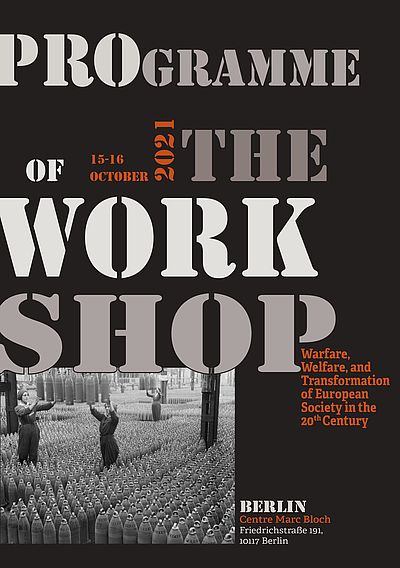Warfare, Welfare, and Transformation of European Society in the 20th Century
October 15 | 09:00
Staat, Recht und politischer Konflikt
The workshop studies the transformative impact of 20th century wars on European societies. It pursues two main research avenues: emphasing a perspective “from below”, by focusing on the relations between society and State policy; deconstructing the traditional view centred on the Nation-State, by analysing the phenomena of mobilisation, demobilisation and transformation according to infra-state (at micro and meso levels) as well as supra-state scales. The existing interdisciplinary scientific literature on the topic scrutinised the causal mechanisms that linked total war with social reforms, the impact of modern warfare on State structures and policies, the consequences of wartime mobilisation on labour movement as well as on constituent bodies. This workshop purposes to shift focus on social actors and “sectional interests” (e.g., unions, employers’ organisations, voluntary sector). It discusses the impact of the war from a transnational and entangled point of view, through the prism of three main phenomena: • the role of the transfers, mutual learning, and competition among the warring parties; • the action of international and humanitarian organisations in the reconsideration of social policy during and after wartimes; • the links between war and social reform in Europe as well as in the colonial territories of European powers. The workshop uses interpretations and methodologies from different disciplines, to have a comprehensive view that integrates the current scientific literature. It also analyses the entangled features of the many links between war and social change by emphasising connections along two binomials: “State-society” and “national-supranational”. As it calls into question the natural primacy of the scale of analysis of the nation-state, it questions the caesura between wartimes and post-war times to consider the processes of war exit (sortie de guerre) and those of social translation beyond the end of the fighting.
Illustration: «Service de déminage» http://www.memoires-champagne-ardennes.com/images/2.
CONTACTS
Michele Mioni (Uni Bremen)
michele.mioni@alumni.imtlucca.it
Fabien Théofilakis (Paris 1/CHS_CMB)
fabien.theofilakis@univ-paris1.fr
RESERVATION
The event should - theoretically - be held in a hybrid format with the presence of a public at the Marc Bloch Center provided that the «3-G» rule (vaccinated, cured, tested) is respected. For those tested, the negative result must not be older than 24 hours (rapid test) or 48 hours (PCR test). To attend, please register by sending a message to the above-mentioned email addresses.
Contact
Fabien Théofilakis
fabien.theofilakis ( at ) cmb.hu-berlin.de
Program
15 October 2021 • Germaine Tillion Room, 7th Floor
9:00-9:15 Welcoming of participants and public
9:15-9:30 Institutional and scientific introductions
9:30-10:00 Keynote: Klaus Petersen (University of Southern Denmark)
10:30-11:15 Panel 1:
Entangling National and International Perspectives: the Case with UNRRA and Italy (WWII)
Healthcare, Politics and Welfare Reforms. The Health Division of the Unrra Italian Mission, 1944-1947
Silvia Inaudi (Scuola Normale Superiore – Pisa)
A new school for a new Welfare. Education and social workers in the aftermath of the Second World War in Italy
Domenica La Banca (ISEM/CNR)
Redefining State-society relationships. Humanitarianism, social actors and post-war assistance policies in Italy and France
Giacomo Canepa (Scuola Normale Superiore – Pisa)
11:15-11:30 BREAK
11:30-12:45 Panel 2:
Transformative Impacts of War: State Policy and Social Actors (WWI)
Idlers, Victims, Heroes: the Unemployed under Military Occupation (Belgium, 1914-1918)
Sophie De Schaepdrijver (The Pennsylvania State University), Samuel Kruizinga (University of Amsterdam)
Unreliable Promises: Citizenship, Economic Persecution and Right to Compensation for War Damages in the German case (1914-1928)
Cristiano La Lumia (University of Naples Federico II – Scuola Superiore Meridionale)
‘L’aigle Boche sera vaincu. La tuberculose doit l’être aussi’. National and International Mobilisations against the TB in France, 1914-1922
Michele Mioni (Uni Bremen)
War and the establishment of welfare ministries
Herbert Obinger (Uni Bremen)
12:45-14:00 LUNCH
14:00-15:15 Panel 3:
Transformative Impacts of War: State Policy and Social Actors (WWII)
Hyperinflation as a Laboratory for Socio-economic Reforms: the social foundations of post-war stability in Hungary, 1945-1946
Szinan Radi (University of Nottingham)
Towards «National Welfare»: Social Change and Cooperation between Czechs and Germans during the Second World War
Radka Šustrová (University of Cambridge)
The universal military conscription and its aftermath in Europe: the change of the paradigm of the civil-military relations
Serhiy Choliy (Kyiv Polytechnic Institute)
16 October • Germaine Tillion Room, 7th Floor
9:30-10:45
Panel 4:
Warfare and Welfare on a Global and Transnational Scale (WWI and II)
Europe in need: women in humanitarian aid in the first half of the 20th century
Francesca Piana (ISG – Trento)
From charity to welfare. The transnational role of the Pontificia Commissione di Assistenza (1944-1953)
Elena Serina (University of Naples Federico II – Scuola Superiore Meridionale)
The Warfare-Welfare Nexus in British and French West African Colonies in the Course of the First and Second World Wars
Carina Schmitt & Amanda Shriwise (UniBremen)
11:00 -12:00 General discussion and conclusions
